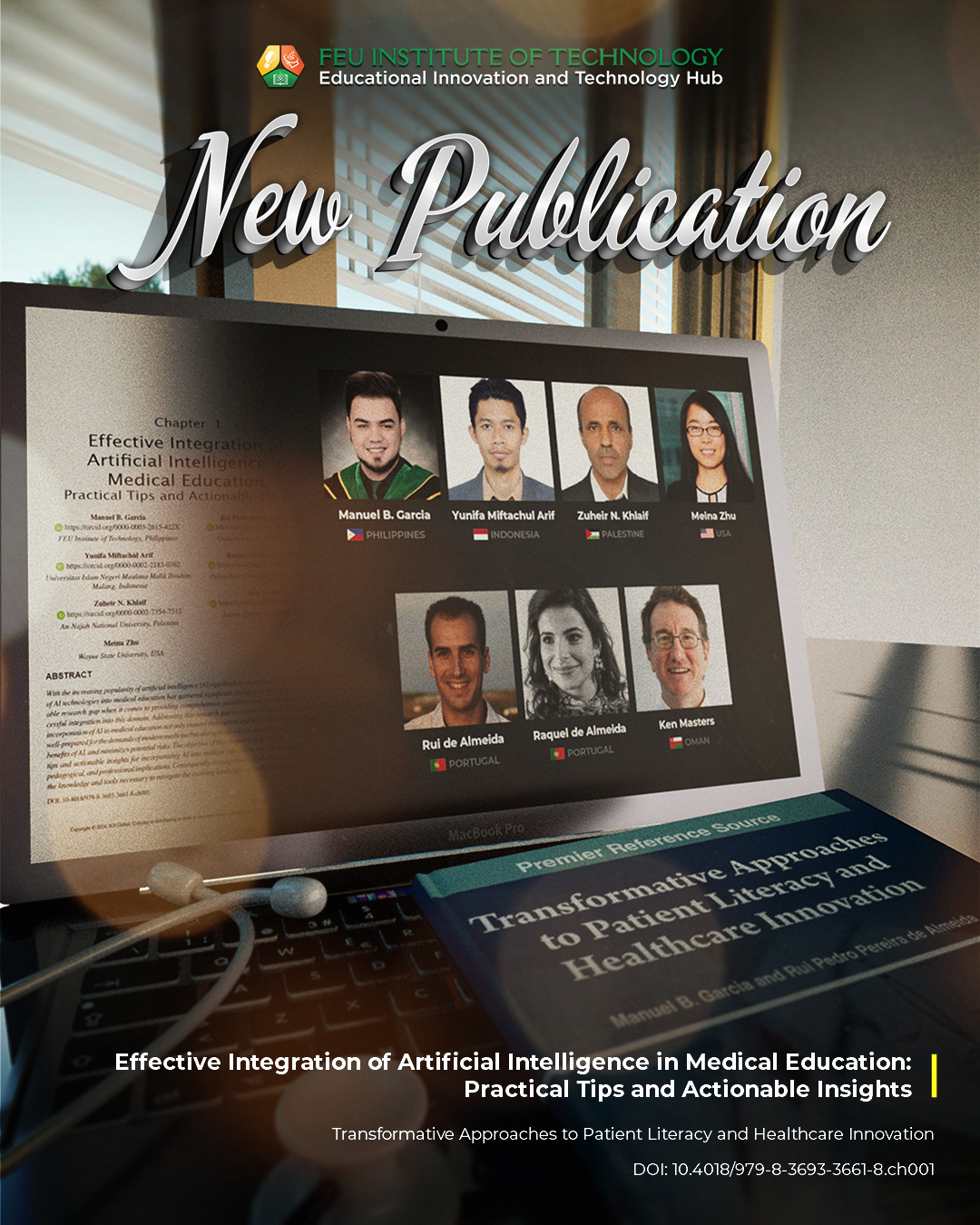AI in the Classroom: How Medical Schools Can Leverage Artificial Intelligence for Better Learning
Explore practical tips and insights for integrating artificial intelligence into medical schools, preparing future doctors for the changing healthcare landscape.
April 1, 2024
Research
Artificial intelligence (AI) is rapidly transforming industries across the globe, and the field of medical education is no exception. AI is injecting new life into traditional teaching methods, offering innovative ways to enhance learning, improve knowledge retention, and prepare future healthcare professionals for the ever-evolving landscape of medicine. However, a gap remains in how stakeholders can successfully integrate this technology into the domain.
The first chapter of “Transformative Approaches to Patient Literacy and Healthcare Innovation,†an insightful book by Manuel B. Garcia (FEU Institute of Technology, Philippines) and Rui Pedro Pereira de Almeida (University of Algarve, Portugal), titled “Effective Integration of Artificial Intelligence in Medical Education: Practical Tips and Actionable Insights†aims to address this challenge by providing practical tips and actionable insights for incorporating AI into medical education to equip medical educators and learners alike.
Sharing their insights for the first chapter, along with Garcia and Almedia, are Yunifa Miftachul Arif (Universitas Islam Negeri Maulana Malik Ibrahim Malang, Indonesia), Meina Zhu (Wayne State University, United States), Raquel Simões de Almeida (Polytechnic University of Porto, Portugal), Zuheir N. Khlaif (An-Najah National University, Palestine), and Ken Masters (Sultan Qaboos University, Oman).
Understanding The Impact of AI in Education
Since its emergence, AI significantly shifted roles, interactions, and skill requirements between educators and learners. This evolving landscape requires educators to take on new responsibilities, like curating and managing AI-driven educational content, overseeing the effective use of AI-based learning platforms, and guiding students in interpreting and applying the insights generated by AI tools. AI also requires medical educators to stay updated on the latest technological advancements and their medical applications while developing the skills to integrate the tools within their teaching frameworks.
On the other hand, medical education learners welcomed new dimensions to the field. They engage with personalized learning algorithms that tailor content and difficulty to individual students, fostering ownership of their learning journey. AI-powered simulations and virtual reality can also help create immersive environments for safe skill development. Yet this shift also requires students to master medical expertise and AI proficiency. They must understand how to use AI tools and their limitations, demanding a balance between traditional learning and technological fluency.
 Tips and Insights That Call For Action
Tips and Insights That Call For Action
According to the paper’s authors, there are several ways for medical educators, learners, and stakeholders to incorporate artificial intelligence into medical education successfully. The first is by giving key stakeholders an active role in the decision-making process in integrating AI into the medical education landscape. Involving educators, practitioners, AI specialists, students, and regulators from the start ensures AI integration aligns with actual needs, anticipates challenges, and fosters shared ownership for a successful implementation.
Strategizing AI incorporation throughout diverse medical disciplines is another viable option to achieve the goal. A comprehensive plan that addresses the dynamics of medical education is necessary and should be multifaceted and account for the disciplines’ diverse needs to ensure it meets each discipline’s unique learning objectives and challenges.
Furthermore, establishing guidelines and ethical policies will help ensure the responsible use of AI technologies in medical education. Medical instructors and students benefit greatly from these frameworks and rules in aiding them to comprehend the moral, legal, and practical ramifications of applying AI. Medical education can leverage AI while maintaining its core beliefs and principles by creating an atmosphere where ethical considerations are priorities.
Conclusion
Integrating AI into medical education requires a multifaceted and considerate approach. The introduction of AI into medical education signifies a fundamental change in the concept of medical education itself. This shift can equip upcoming medical practitioners for a future where AI is vital in healthcare delivery rather than only serving as an auxiliary tool. As a result, using AI in medical education will significantly impact patient outcomes, healthcare quality, and system efficiency.
Besides the practical tips and actionable insights mentioned throughout the paper, educators and learners in the field of medical education should also learn to adapt and grow with AI’s uses and technology in the healthcare industry. Educators and institutions can guarantee that medical graduates can meet the demands of the current healthcare environment and are poised to take the lead in the healthcare industry’s future by remaining adaptable and progressive.
Patricia Bianca S. Taculao-Deligero is a Bachelor of Arts in Journalism Graduate from the University of Santo Tomas. She has an extensive portfolio from working in various local media outlets, with articles focusing on lifestyle, entertainment, agriculture, technology, and local government units, among other subjects. Her specialty is in feature writing. She is also proficient in news writing.
